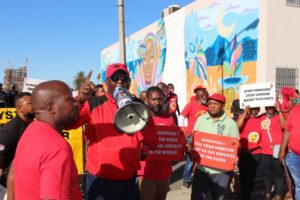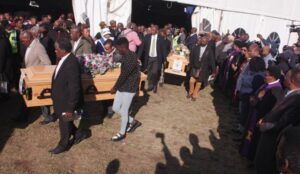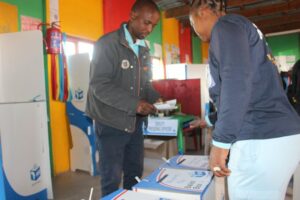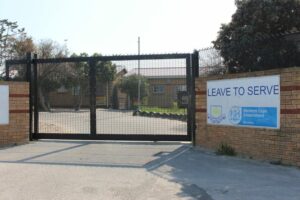It’s been two years now since the Metrorail Central Line in Cape Town was operational, having last operated in November 2019. Infighting over tenders, political interference, poor management and vandalism during lockdown have all contributed to the collapse in the train service on this busy line which services the poorest of Cape Town’s townships. The suspension of the Central Line and MyCiti bus route between Khayelitsha and Cape Town has meant commuters have had to dig deep in their pockets to afford other modes of transport. Elitsha spoke to a few of them to find out how they have been affected, .
Nosipho Feleza (33) works as a waitress in Muizenberg and describes the closure of the Central Line as “a huge blow for the poorest of the poor like myself.” Feleza had relied on the train service to travel to work and says she spent far less than she has to now. Whereas a monthly train ticket cost her less than R300, she now spends double that amount. “Life has been tough for us ever since the trains stopped operating here in Khayelitsha. I spend more money on taxi fare and it’s even hard to afford some of the luxuries I used to enjoy such as doing my hair or spoiling my daughter once in a while. Now the money goes into the necessities. I wish the train service can be restored,” she says.
Just like many residents, Feleza heard rumours that the service will be restored at the end of 2021 but she is not raising her hopes. “How many times have we heard those promises? Instead, the railway stations are now a playground for amaphara (thugs). I think the government and transport authorities need to admit that they have failed us as the people of Khayelitsha. But sadly one can’t help but ponder whether, for instance, it would have taken this long to restore another line such as the southern line or any other line servicing the rich suburbs,” she says.
Despite being already hit hard in the pocket by the high taxi fares, the single mother of one is also faced with the burden of providing for her unemployed siblings. “Life is tough during these Covid-19 times and the lockdown hasn’t helped matters. For instance right now I am sitting at home and only get called on certain days. We are depending on the mercy of the president when he calls another family meeting and informs us if we can be able to get back to normality,” she says.
Train delays and ailing infrastructure were big features of the Central Line. Archive photo by Mandla Mnyakama
Feleza’s sentiments are echoed by another resident, Sinoxolo Poyo (27) who says he is feeling the pinch of the closure of public transport. Poyo recalls how he once had easy access to work ever since he started working as a security guard in Claremont back in 2017. When the easy train ride to work came to an end in 2019, Poyo was lucky to join a lift club soon after the trains stopped operating.
He paid a reasonable monthly fare but then he was forced to rely on taxis after the lift club’s car broke down. “Life has been a struggle ever since the trains stopped operating. With a meagre guard’s salary with many responsibilities, I only live for another payday. Groceries are quite expensive nowadays and on top of that I have to send some money back home in the Eastern Cape every month. The worst part is that government doesn’t seem to have a plan in place to tackle this transport issue in Khayelitsha. They were supposed to have come with a plan long time ago. I don’t think they have our interests at heart at all,” he says.
Poyo says he spends around R600 every month taking taxies to work. “I have to make sure I put aside that amount every month. But then you sometimes end up using the money on other things and have to go to mashonisas [loan sharks], which exacerbates your situation,” he says.
Meanwhile, other residents who spoke to Elitsha on condition of anonymity say despite the promises, they doubt the trains will ever operate on the Central Line again. “There are some industries that benefit as a result of the collapse of the MyCiti and train service in Mitchells Plein and Khayelitsha. So do you really think that those industries are just going to fold their arms and allow the trains to resume again while they’ve been making huge gains as a result of the non-operation of trains?” asks one resident.
Samantha Thomas (35) is a Mitchells Plain resident who works as a retail store cashier in Sea Point. With the little salary that she earns she is struggling with transport costs. “It was way better when the trains were still operating. But now the salary only goes to grocery and transport and I’m left with nothing. I am a single mother and with Christmas coming I don’t know how I will be able to buy clothing for my daughter. I spend close to R1,000 on a monthly bus ticket. It is a lot. I just wish the trains can return,” says Thomas.
The City of Cape Town says that they are close to concluding an agreement that will see MyCiti bus services resuming in Khayelitsha and Mitchells Plain. Archive photo by Sinethemba Mbewana
Prasa spokesperson, Andiswa Makanda says Prasa has been running a very limited service from Cape Town to Langa since February 2021. Contractors have been appointed to reinstate parts of the high voltage infrastructure on the lines. “Some works have started. Other high voltage infrastructure works like the repair of vandalised substations have been put out on tenders but the tenders are still being evaluated. Prasa has also received designs for the walling and security project for the Central Line,” Makanda says. She points out that these tenders have still to be advertised once Prasa is complete with its internal procurement processes.
Works on the actual tracks, she says, has been hampered by illegal occupiers on the track. Makanda says that the main cause of the delay to resume services is the removal of the illegal settlements in Langa, Philippi, Nolungile and Nonkqubela. “There have been various challenges with land that was identified to relocate the illegal occupiers. Prasa is working with all relevant governmental, provincial and municipal departments to find solutions to the challenge of relocating the illegal occupiers so that repair works can be completed. Prasa’s internal procurement processes have also been slower than expected as a result of changed working conditions required by Covid-19 protocols.
Asked what is being done to prevent cable theft on this line, Makanda says Prasa is intending to construct a wall on the boundary of the entire Central Line starting in Cape Town and extending to Bellville, Chris Hani and Kapteinsklip stations: “The walling will be complemented by CCTV, lighting and internal service roads for security response teams. Prasa also intends having more security teams that are adequately equipped to respond if criminals get access to the rail infrastructure.”
By when are they expecting to finally resume services?
Makanda doesn’t want to commit, only saying, “It is difficult to accurately predict when the line will be operational again… Prasa is dependent on a number of other governmental partners to successfully remove the illegal settlements. The current plan is that the illegal settlements will be removed in the latter half of 2022 and that the line to Kapteinsklip and Chris Hani stations can be operational again in December 2022,” she says. This goal date will be postponed if the rail agency is unable to remove occupiers off the tracks in time. She says Prasa will put back more train services in a phased approach as and when the repairs to the infrastructure are completed and the illegal settlements are removed.
City of Cape Town’s Mayoral Committee Member for Transport, Councillor Roberto Miguel Quintas, told Elitsha that great progress had been made in implementing the MyCiti Phase 2A project, which will provide a quality bus service between Khayelitsha, Mitchells Plain, Philippi, and Wynberg and Claremont. Said Quintas: “I am particularly pleased that we are close to concluding an agreement with all parties to recommence the MyCiti N2 express service between the CBD and Mitchells Plain and Khayelitsha.”





